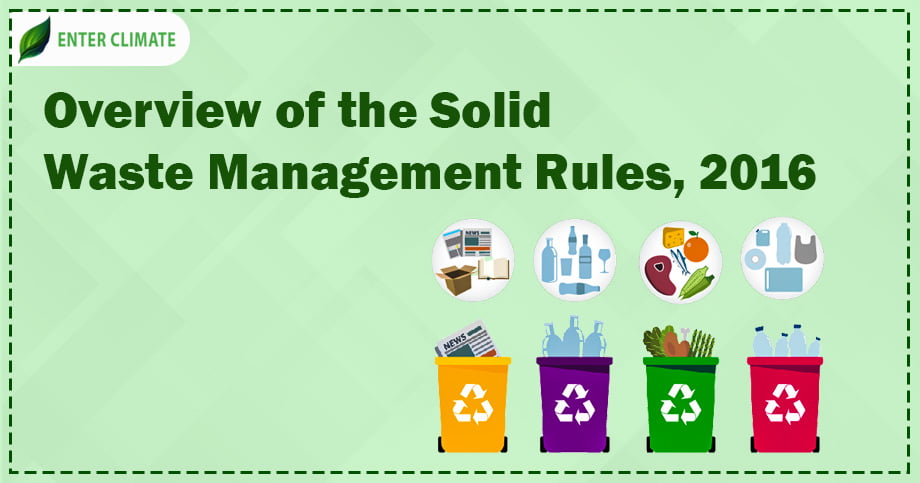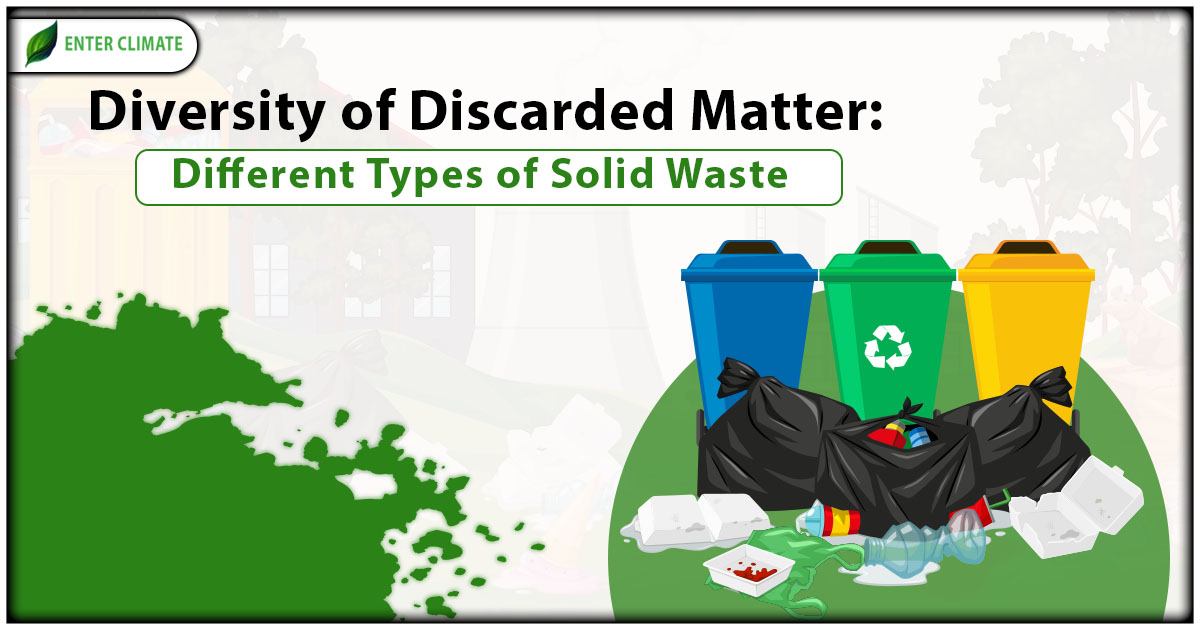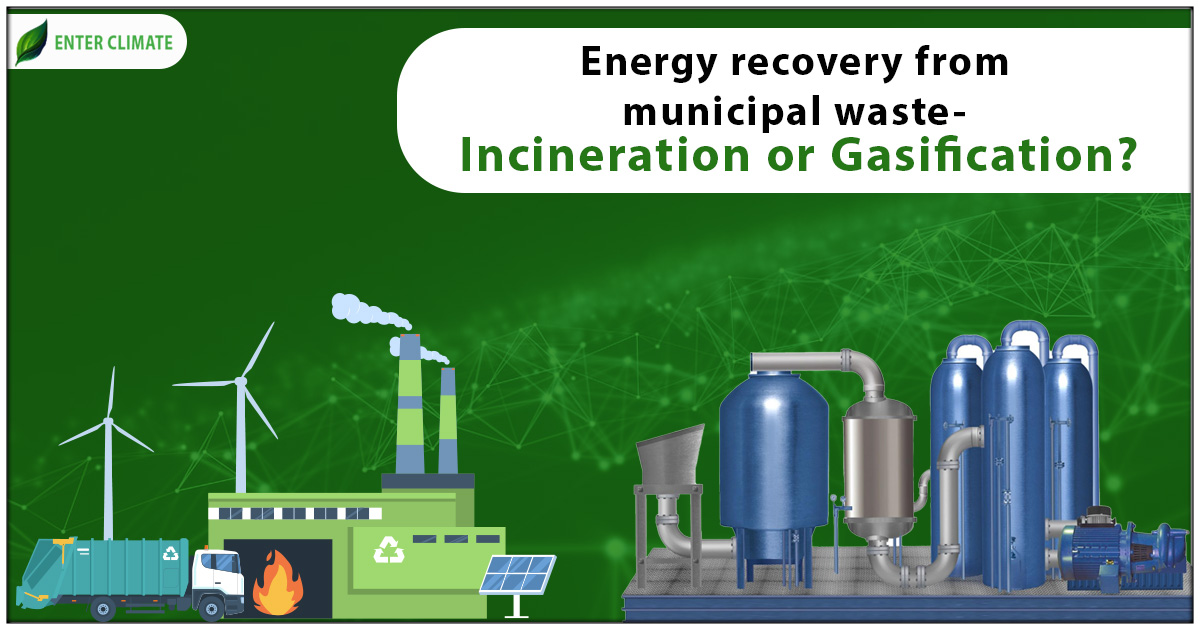A overview of Solid Waste Management Rules, 2016
 29 Oct, 2022
29 Oct, 2022 
With the ever-increasing urbanisation and population, waste management has posed a huge challenge in the country. The Solid Waste Management Rules, 2016 define ‘solid waste’ as solid or semi-solid waste which includes
- sanitary waste
- domestic waste
- institutional waste
- commercial waste
- catering and market waste
- other non-residential wastes,
- silt removed or collected from the surface drains
- street sweepings
- horticulture waste
- treated bio-medical waste, excluding industrial waste
Scientific disposal of solid waste via an efficient process of collection, segregation, treatment and disposal in an environment-friendly way reduces the adverse effect on the environment. The local authorities stand responsible for developing the infrastructure to execute the entire process of Municipal Solid Waste (MSW) Management.
Market analysis of waste generated in India
It is projected that around 62 million tonnes of waste is generated yearly in India. In 2011, the per capita waste generation in cities of India was shown to range between 200 grams and 600 grams per day. Interestingly, 43 million tons per annum (TPA) gets accumulated, 11.9 million is treated, and 31 million goes to dumping in landfill sites.
The MSW generation is expected to increase to 165 million tonnes by 2031 and to 436 million tons by 2050. If cities keep on dumping the waste without treatment at the present rate, we will require 1240 hectares of land annually. Furthermore, with the predicted of 165 million tons of waste by the year 2031, the need to set up a landfill for 20 years of 10 meters in height will need 66,000 hectares of land.
Authorities responsible for analyzing Solid Waste Management Rules, 2016 implementation in country
The Ministry of Environment, Forest and Climate Change (MoEF[1]) will monitor the implementation of Solid Waste Management Rules in India. Besides, the ministry will create a Central Monitoring Committee under the Chairmanship of the Secretary, MoEF.
Areas of Applications of Solid Waste Management Rules in India
The rules shall apply to the following areas –
- Outgrowths in urban agglomerations,
- Every urban local body
- Notified areas
- Census towns as stated by the Census Commissioner and Registrar General of India
- Notified industrial townships
- Airports
- Areas under the control of Indian Railways
- Airbases
- Ports and harbours
- Special economic zones
- Defence establishments
- Pilgrim places of historical and religious importance as may be notified by the respective State governments from time to time
- State and Central government organisations
- Every institutional, domestic, commercial and any other non-residential solid waste generator
Duties of various authorities and personnel involved in effective Solid Waste Management Rules, 2016 implementation
1. Duties of waste generators
By definition, as stated in the Solid Waste Management Rules, 2016, waste generator means every individual or group of persons, every residential and non-residential premise such as defence establishments and Indian Railways. Every waste generator must perform the following duties to efficiently execute these rules.
(a) Segregate and store the waste generated in three categories: non-biodegradable, bio-degradable and domestic hazardous wastes in specific bins. Subsequently, this segregated waste must be handover to authorised waste collectors or waste pickers.
(b) Securely wrap the used sanitary waste and place them in the non- bio-degradable or dry waste bin.
(c) Separately store and dispose of demolition, construction, horticulture and garden waste.
(d) No waste generator shall burn, throw, or bury solid waste in open public spaces, streets, water bodies, or drain.
(e) All waste generators must pay a user fee for solid waste management. As per the definition in Solid Management Rules, 2016, a user fee is a fee imposed on the waste generator by the local body and any entity indicated in rule 2 to offer waste management facilities.
(f) Organising an event with more than one hundred people at a place without licence without informing the local body isn’t allowed. Applicant must obtain approval by informing at least three working days in advance.
(g) Every street vendor must have suitable containers for storage of waste generated and shall submit the waste at a waste storage depot, vehicle, or container as mentioned by the local body.
(h) All resident welfare and market associations or gated institutions and communities having more than 5,000 sqm area or hotels and restaurants in partnership with the local body shall ensure effective management of the generated waste within an year from the date of publication of SWM rules.
2. Duties of the Ministry of Environment, Forest and Climate Change (MoEF)
Besides monitoring the implementation of Solid Waste Management Rules, 2016 in India, the ministry will set up a Central Monitoring Committee under the Chairmanship of Secretary, MoEF, which will meet at least once yearly to review and monitor the implementation of these rules. The Committee must be renewed every three years.
3. Duties of Ministry of Agriculture, Government of India (GoI)
The Ministry of Agriculture, through appropriate mechanisms, must –
(a) Offer flexibility in Fertiliser Control Order for selling and manufacturing compost.
(b) Publicise usage of compost on farmland.
(c) Establish laboratories to test compost quality produced by local authorities or their authorised agencies.
(d) Issue guidelines for maintaining the ratio of use and quality of compost and chemical fertilisers while using compost on farmland.
4. Duties of the Central Pollution Control Board
The Central Pollution Control Board must –
(a) Co-ordinate with the Pollution Control Committees (PCC) and the State Pollution Control Boards (SPCB) for implementing Solid Waste Management Rules and adhering to the prescribed standards set up by local authorities.
(b) Establishing the regulations for ambient air, groundwater, noise pollution, and leachate regarding all disposal facilities and solid waste processing.
(c) Review environmental norms and standards mentioned for solid waste processing units or treatment technologies and improve them when required.
(d) Review the implementation of prescribed environmental standards at least once a year and compile the data monitored.
(e) Review the proposals of PCC or SPCB on using new technologies for recycling, processing and treatment of solid waste. Additionally, prescribe emission norms and performance standards within six months.
(f) Monitor the implementation of these rules by local bodies.
(g) Publish guidelines for maintaining buffer zone and on environmental aspects of disposal and processing of solid waste to allow local bodies to adhere to the provisions of these rules.
(h) Guide Union Territories or States on inter-state movement of waste.
5. Duties of Pollution Control Committee (PCC) or State Pollution Control Board (SPCB)
The Pollution Control Committee or State Pollution Control Board must-
(a) Enforce Solid Waste Management Rules, 2016, in their state and review implementation of these rules at least two times in a year.
(b) Monitor environmental standards and adhere to Schedule I and II conditions for waste processing and disposal sites.
(c) Analyse the authorisation proposal and make such inquiries as considered fit after receiving an application in Form I from the LB or any other authorised agency.
(d) Grant authorisation within two months in Form II to the local body.
(e) Synchronise the authorisation validity with the validity of the consent.
(f) In case of new technologies, where PCC, CPCB or SPCB has not prescribed any standards, shall approach CPCB to get standards specified.
(g) PCC or SPCB may instruct local bodies on the safe disposal and handling of domestic hazardous waste collected by the waste generators at hazardous waste deposition units.
(h) PCC or SPCB will regulate the Inter-State movement of waste.
The process to get authorisation under Solid Waste Management Rules, 2016
To get the authorisation, every local authority of census towns and village panchayat must apply Form 1 to establish a waste processing, treatment, or disposal facility. If waste exceeds five metric tonnes per day, then the following documents are required: –
- Documents showing land ownership for solid waste processing site
- Project report on Solid Waste Management
- Municipal Solid Waste Annual Report of the previous year
- Work order or authorisation issued to the operator of the solid waste processing facility
- A permit from district level site selection committee
- Technical details of waste to energy plant or recycling plant
- Once the complete application and supporting documents are submitted, SPCB examines the proposal for authorisation
- After that, SPCB must issue authorisation within two months under Form 2 to village panchayat and local authorities running waste treatment, processing, or disposal facility.
- In case of cancellation of authorisation due to the facility failing to fulfil the conditions specified under the rules, the local body or operator should be served with proper notice.
When can the authorisation get cancelled or suspended?
According to new Solid Waste Management Rules, PCC or SPCB can suspend or cancel the authorisation issued under clause (a) at any time if the local operator or body of the facility fails to run the facility according to the norms specified: provided that no such authorisation shall be cancelled or suspended without giving notice to the local operator or body.
Renewal of the authorisation
On receiving the renewal application, PCC or SPCB renew the authorisation for the next five years. This is done after scrutinising every application on merit and according to the condition that the facility’s operator has fulfilled all the provisions of the standards, rules, or conditions mentioned in the consents, authorisation, or environment clearance.
However, PCC or SPCB shall refuse to grant or renew an authorisation after offering enough chances to the applicant of being heard and for reasons thereof to be recorded in writing.
6. Duty of brand owners or manufacturers of disposable products and sanitary napkins and diapers
(a) All manufacturers of disposable products like plastic packaging, glass and so on or brand owners introducing such products in the market must offer required financial assistance to local authorities for setting up of solid waste management system.
(b) All such brand owners who market or sell their products in non-biodegradable packaging material must establish a system to gather back the packaging waste generated due to their production.
(c) Brand owners, manufacturers, or marketing companies of diapers and sanitary napkins must explore the odds of utilising all recyclable materials in their products. Alternatively, they shall offer a wrapper or pouch for disposal of each diaper or napkin along with the packet of their sanitary products.
(d) All such brand owners, manufacturers or marketing companies must be aware of the masses for wrapping and disposal of their products.
Criteria mentioned in Solid Waste Management Rules for duties regarding establishing solid waste processing and treatment facility
(1) The concerned department of the allocation of the land assignment will be held responsible for offering suitable land for the establishment of the solid waste treatment and processing facilities and notify such sites by the Union Territory Administration or State Government.
(2) The facility’s operator must design and establish the facility according to the technical guidelines issued by the CPCB regarding this at regular intervals and the manual on SWM prepared by the Ministry of Urban Development.
(3) The facility’s operator must get necessary approvals from the PCC or SPCB.
(4) The PCC or SPCB must analyse the environmental standards of the operation of these facilities.
(5) The operator of the facility will be responsible for the secure and environment-friendly operations of the SW processing and/or treatment untis according to the norms set up by the CPCB at regular intervals and the manual on Municipal SWM issued by the Ministry of Urban Development and updated regularly.
(6) The solid waste processing and treatment plant operator must submit an annual report in Form III every year by 30th April to the PCC or SPCB and the concerned local body.
Time Frame for Implementation of Solid Waste Management Rules:
(a) Identifying landfill: 1 year
(b) Ensure segregation of waste: 2 years
(c) Cities up to 1 million population: 2 Years
(d) Procurement of waste processing facilities: 2 years
(e) Setting up sanitary landfills: 3 years
(f) Bioremediation/capping of old landfills: 5 years
(g) Million plus cities: 3 years
An essential revision of parameters and existing standards made under Solid Waste Management Rules, 2016
Under Solid Waste Management Rules, 2016, essential updates clearly state that the deposit site should be 200 meters from a pond, 100 meters from the river, 200 meters from habitations, highways, water supply wells and public parks and 20 km away from airbase or airports.
Updates are made on the emission standards, including furan, dioxin and particulate matter reduction limits.
The compost standards were also updated to comply with the Fertiliser Control Order.
Conclusion
It will take some years to observe the drastic change that Solid Waste Management Rules 2016 will bring to India. Seeing how segregation at source works on the ground is challenging and exciting. Awareness campaigns with NGOs, communities, students and other stakeholders may work wonders to push for better implementation of SWM Rules. Moreover, the rules need to focus on awakening people about concerns, issues and management of solid waste.













